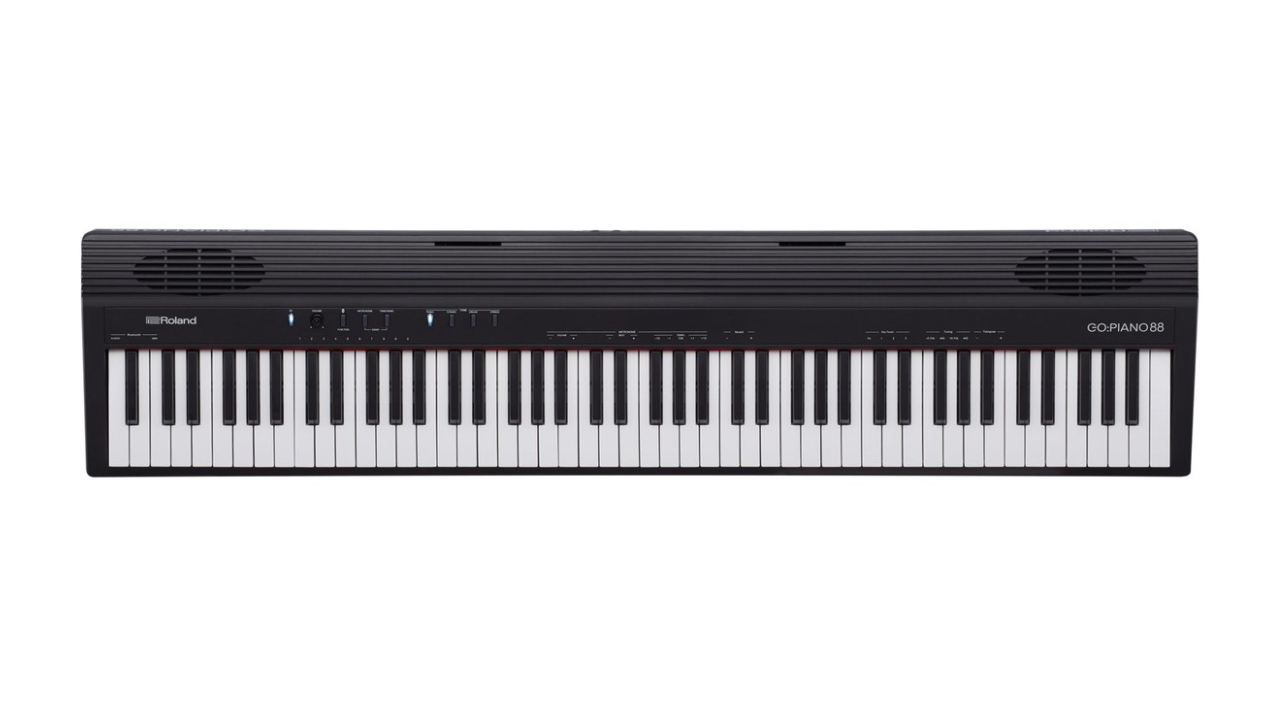MusicRadar Verdict
For players taking the first steps of their musical journey, the Roland GO:PIANO may be the perfect companion. Combining the convenience and price point of a keyboard with the full-sized keys of a piano, the GO:PIANO is ideal for beginners looking for an inexpensive way to start playing a new instrument.
Pros
- +
Lightweight and portable
- +
Full-sized keys
- +
Bluetooth Audio
Cons
- -
Only four tones
- -
Inbuilt speakers lack depth
MusicRadar's got your back
Roland GO:PIANO 88 review: What is it?
All beginner piano players face the same dilemma - do you buy a piano straight away or start with one of the best keyboards for beginners and progress from there? While keyboards can be an inexpensive option, the small nature of the keys, as well as the limited octave range can lead to bad habits being developed. That said, full-sized digital pianos also have their downsides. They are typically more expensive, can take up a lot of space, and aren't exactly the most portable. This is where the Roland GO:PIANO 88 comes in. This beginner-friendly piano is designed to bridge the gap between a piano and a keyboard, giving you the best of both worlds.
The Roland GO:PIANO 88 features everything you need to kick start your piano-playing journey. The 88 keys, while not fully weighted, are styled after a traditional piano, allowing you to develop the correct technique straight from the off, and become a more expressive and dynamic player, as a result. Utilising a lightweight and rugged design as well as the option to be fully battery-powered, the GO:PIANO will follow you anywhere the music takes you - whether that's simply at home practising, rehearsals with your band, or busking on a street corner.
This modern portable piano features high-quality onboard Bluetooth speakers that hook up to any smartphone or device to create a simple and compact learning solution. Once connected, you'll unlock a wealth of learning resources that will make mastering the piano faster, simpler and, more importantly, more enjoyable!
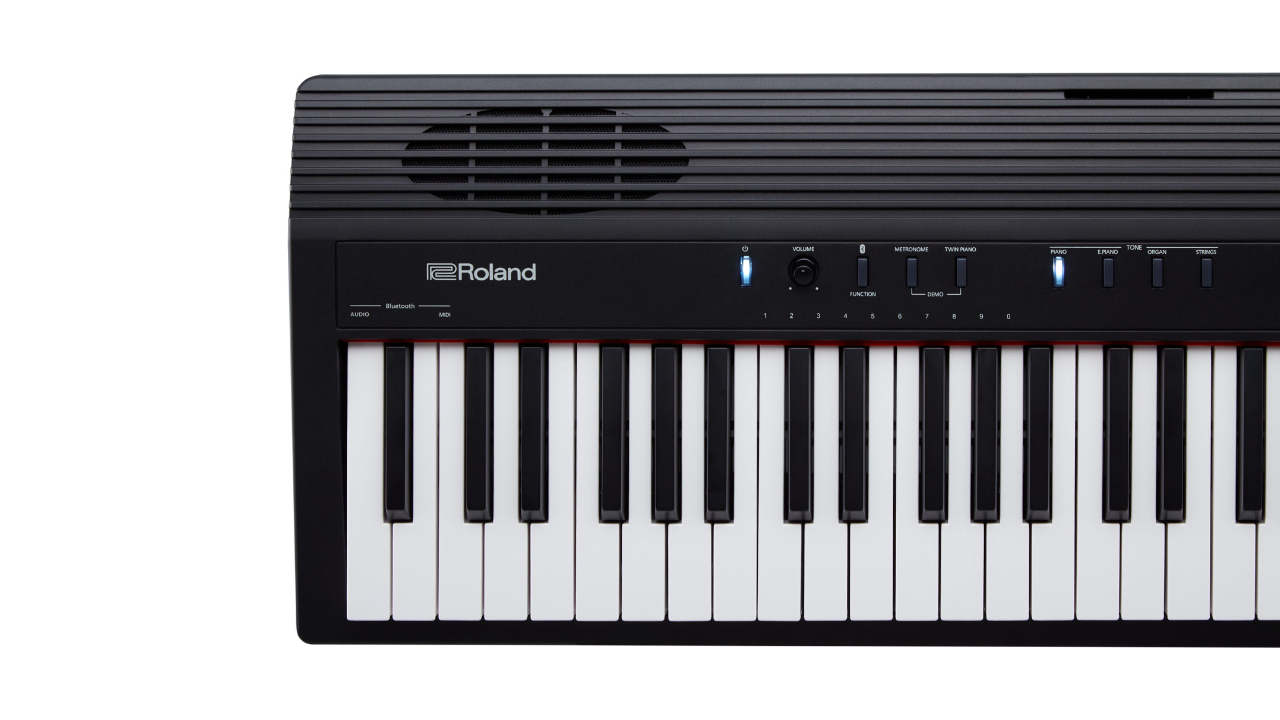
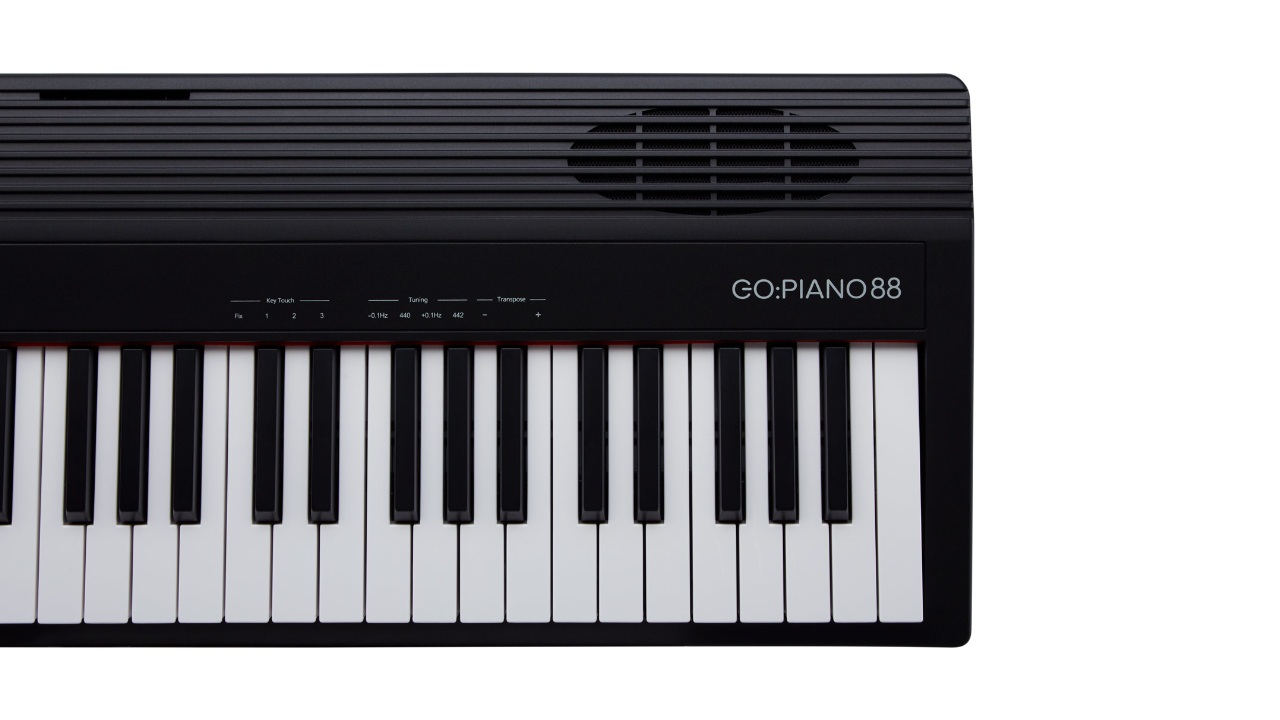
Roland GO:PIANO 88: Performance & verdict
Arguably the most crucial aspect of any piano is how it feels to play - so let's start there. Featuring semi-weighted keys, the Roland GO:PIANO won't fool anyone into thinking they are playing a concert grand - but then again, that's not the goal of this entry-level instrument. While the keys may feel a little light for experienced players, they are ideal for beginners or people who find it challenging to play with fully weighted keys. While the keys themselves may not be as heavy as a regular piano, they do share the same dimensions and styling - a nice touch for those looking to get used to the key spacing of a traditional piano.
The GO:PIANO does allow you to choose between four levels of sensitivity - fixed, light, medium and heavy. It's safe to say that the medium setting was the most useful for us, with the heavy mode feeling sluggish - although which you prefer will depend on how you play, so experiment with each type and see what suits you best. It's worth noting that this does not change the physical weight of the key but instead how expressive the keys are.
If the feel of the piano is of the utmost importance to us, then the sound is a very close second, but how does the Roland hold up to the competition? Overall the sounds are of a very high standard, although we can't help feel the GO:PIANO is lacking compared to others on the market. We only have four tones here - Piano, E. Piano, Organ and Strings - and while each voice sounds great, a little variation would be nice. Okay, we know if you were to purchase a real piano, you only get one sound - piano - but, with so much on offer in this very crowded market space, and with the history Roland has for creating some of the most famous sounds of all time, we can't help but long for the inclusion of extra voices.
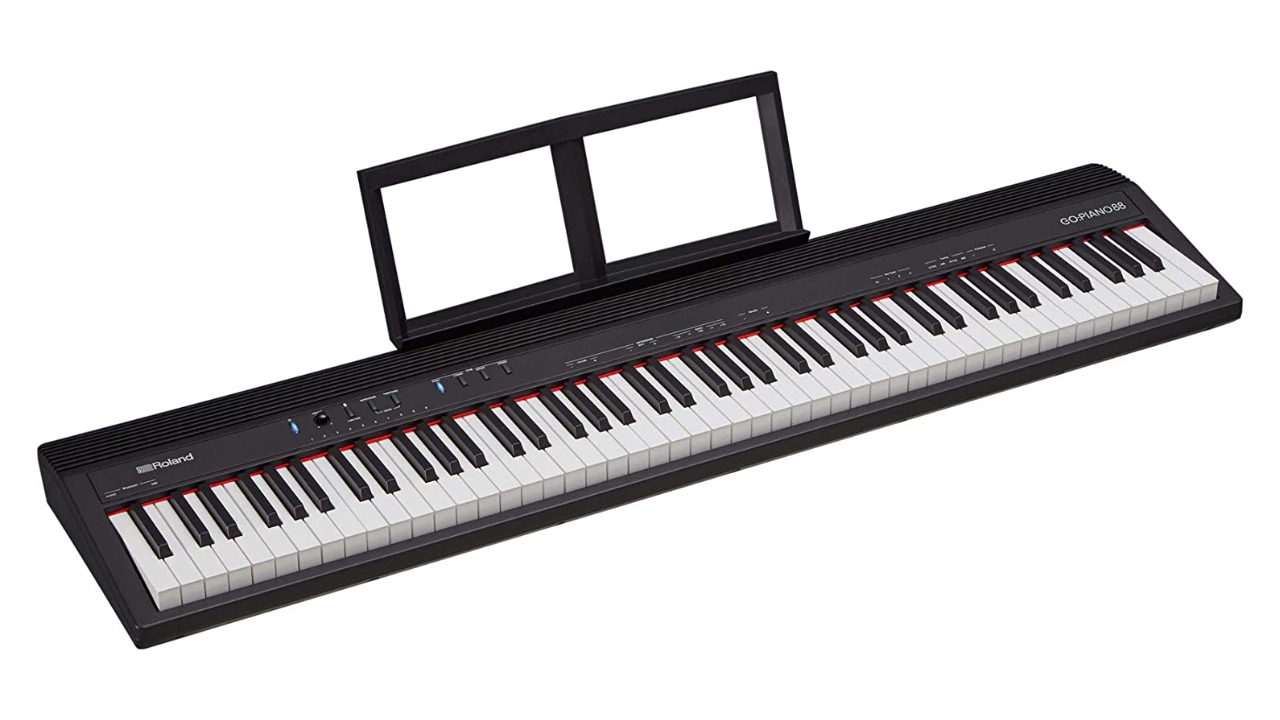
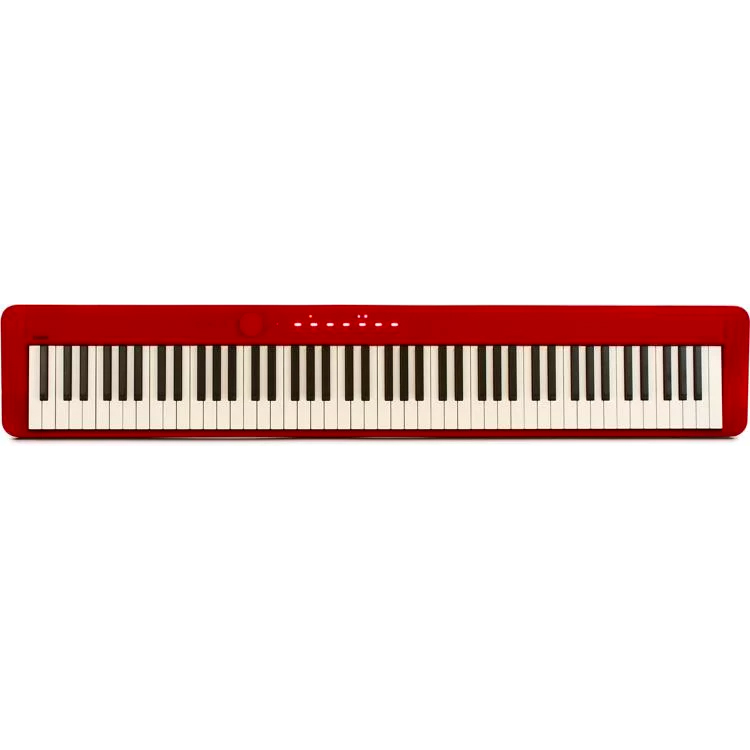
Yamaha NP-32: Featuring Yamaha's world-class build quality and superb sounds, the NP-32 is another fantastic beginner piano option.
Casio CDP S-100: For those looking for weighted keys, the CDP S-100 might just be one of the most affordable on the market.
This piano does allow you to layer two voices together - by simply pressing two of the buttons at the same time. This can produce some interesting results, for example, the piano and electric piano merged together is a rather cool sound, although, unfortunately, the piano and strings setting is a little unbalanced - you can struggle to hear the piano under the lush orchestral strings.
The in-built speakers do as good a job as they can to reproduce the low-end of a piano or organ, but unfortunately, they simply aren't big enough to accurately portray the bass response typically found in a real piano. That said, the Roland does come alive when you use a quality set of studio headphones. This allows you to hear the voices in their full glory.
Right, so we've covered the piano element of the GO:PIANO, let's now talk about the "go" part. Coming in at a measly 7kg, this piano is very portable and certainly lives up to its name. Even though it covers the full frequency range of a piano, it doesn't feel bulky or cumbersome. You can easily take this instrument to piano lessons, band rehearsals or even shows, with no hassle at all. Running on batteries as well as a power supply, this Roland would also be ideal for buskers or players who need a reliable instrument when they are on the... go.
The ace up the sleeve of this entry-level instrument in the inclusion of Bluetooth audio and MIDI.
The ace up the sleeve of this entry-level instrument in the inclusion of Bluetooth audio and MIDI. This means you can not only hook up your smartphone for playing along with your favourite songs but also take advantage of the best online piano lessons, as well as the free Roland Piano Partner 2 app. In addition, Roland is also offering a free 3-month subscription to the Skoove learning platform when you purchase a Roland piano, meaning you'll have command of your new instrument in no time.
In the box, you'll find a rather rudimentary yet serviceable sustain pedal, which may not be the most responsive, but it will most definitely get you started. This is a relatively standard affair with pianos of this nature, so we can't complain too much. You can always upgrade once you feel you've outgrown the basic pedal. You'll also find an ample music rest, which feels sturdy and capable of holding a decent sized music book - so you should have no problem keeping your sheet music in order.
- Our pick of the best digital pianos under $1,000/£1,000
Roland GO:PIANO 88: Hands-on demos
Gear4Music
Musician's Friend
Roland
Roland GO:PIANO 88: Specifications
- Number of Keys: 88 keys (Box-shape Keys with velocity)
- Touch Sensitivity: 3 types
- Maximum Polyphony: 128
- Tones: Piano, E.Piano, Organ, Strings
- Effects: Reverb
- Sampling Frequency: 44.1 kHz
- Bluetooth: Audio/MIDI
- Amplifier Power Output: 10 W x 2
- Power: AC adaptor or Alkaline battery
- Connectors: PHONES/OUTPUT, SUSTAIN PEDAL, USB, USB Micro-B type (MIDI)
- Size: 1,283 mm x 291 mm x 87 mm
- Weight: 7.0 kg
- Contact: Roland
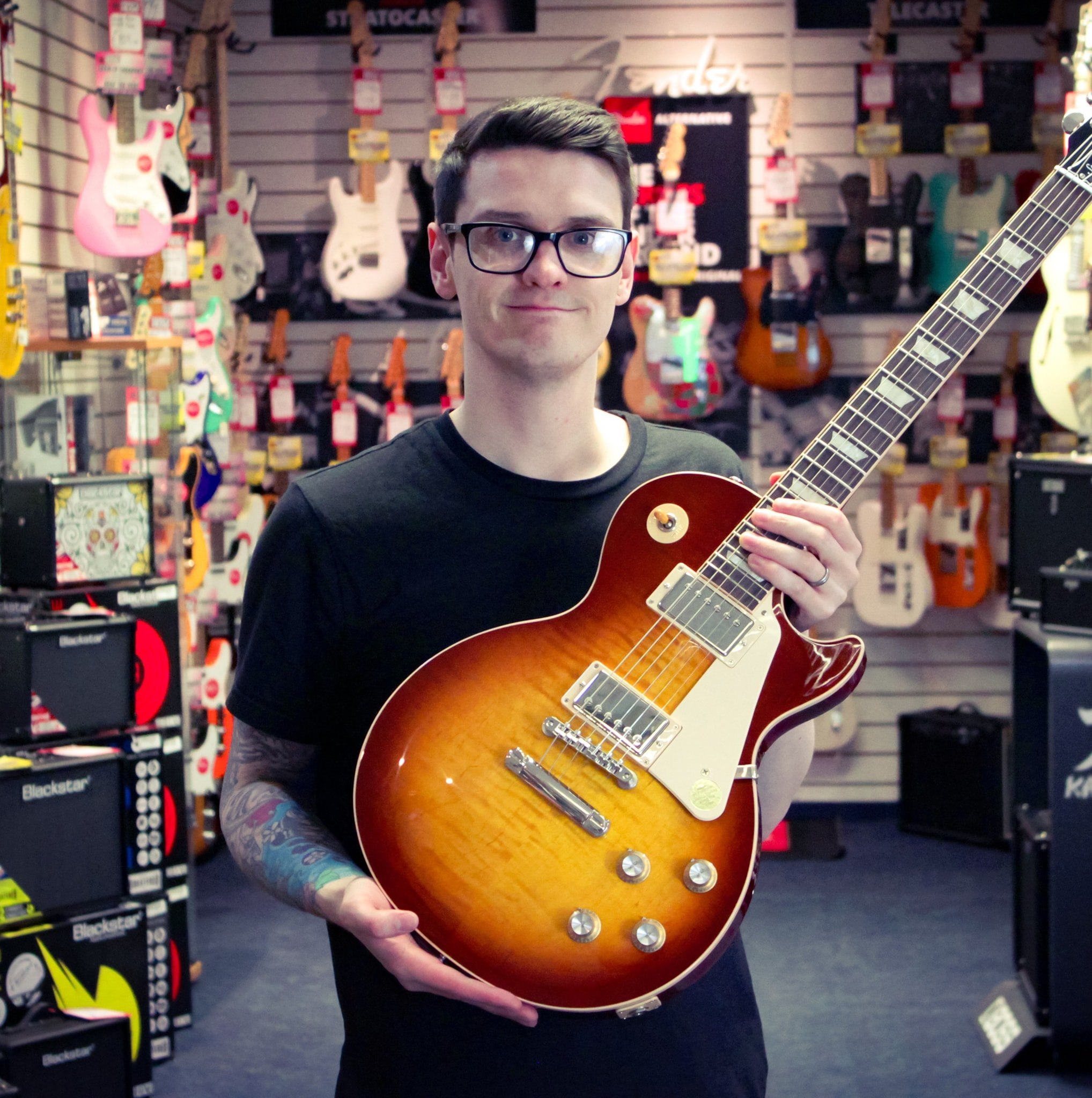
I'm a Senior Deals Writer at MusicRadar, and I'm responsible for writing and maintaining buyer's guides on the site - but that's not all I do. As part of my role, I also scour the internet for the best deals I can find on gear and get hands-on with the products for reviews. My gear reviews have been published in prominent publications, including Total Guitar and Future Music magazine, as well as Guitar World.com. I've also had the privilege of interviewing everyone from Slash to Yungblud, as well as members of Sum 41, Foo Fighters, The Offspring, Fever 333 and many more.
I have a massive passion for anything that makes a sound, particularly guitars, pianos, and recording equipment. In a previous life, I worked in music retail, giving advice on all aspects of music creation and selling everything from digital pianos to electric guitars, entire PA systems, and ukuleles. I'm also a fully qualified sound engineer who holds a first-class Bachelor's degree in Creative Sound Production from the University of Abertay and I have plenty of experience working in various venues around Scotland.
Brace yourself: Bryan Adams didn’t buy his first real six-string in a five and dime
“Nobody listens to one genre. I literally don’t know anybody who listens to one genre. You can be a fan of so many different artists at once”: Laufey on what Gen Z can teach the rest of us about how to appreciate music
Bon Iver - ranked: from Sable, Fable to For Emma, Forever Ago
